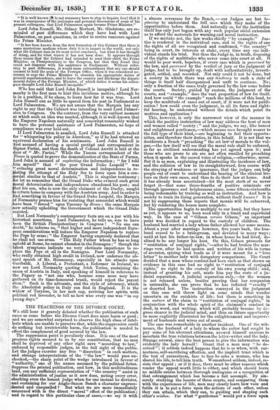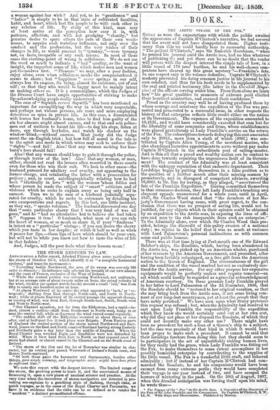THE TEACHINGS OF THE DIVORCE COURT. WE still hear it
gravely debated whether the publication of such cases as come before the Divorce Court does more harm or good ; and we are somewhat surprised to observe the high class of intel- lects which are unable to perceive that, while the suppression could - do nothing but irretrievable harm the publication is needed to effect the complement of good secured by the law. The suppression point is peculiarly clear. It is one of the most precious rights secured to us by our constitution, that no man shall be deprived of any other right save "according to law," enforced by responsible judges, in the full sight of the public. Let the judges exercise any free "discretion" in such matters, and strange interpretations of the "the law" would, pass un- ehecked,—the sharp point of the wedge introduced in favour of "authority," one of the names assumed by the political Satan. Suppress the printed. publication, and how, in this multitudinous land, can any sufficient representation of "the country" assist in the administration of justice as it now does, noting every error, checking even the honest judge when for one instant he deviates, and sustaining for our Anglo-Saxon Bench a character unprece- .dented and unequalled ? But what we are more immediately concerned with is the direct " moral " effect of the publication; and in regard to this particular class of cases,—we say it with
a sincere reverence for the Bench, — our Judges are but be- ginning to understand the full uses which they make of the opportunities before them. And. naturally so, for the institution itself has only just begun with any such popular siicial extension as to afford the materials for warning and moral instruction.
If we mistake not, the law works chiefly " by example." Jus- tice is rendered in the individual case, and in the rights of one the rights of all are recognized and confirmed, " the country" i
being n court, its interests at stake, every time any one jai- vidual stands his trial. But thus the Judge is, in truth, disposing of the rights of multitudes who never come into court at all. It would be poor work, hopeless, if every case which is governed by the law, and governed by the verdict of jury or the judgment of judge, had to be brought up, dealt with authoritatively, investi- gated, settled, and recorded. Not only could it not be done but a society in which there was any tendency to such a stale of things is itself half disorganized and unfit to continue. No; only a fraction of the cases truly governed by the law come before the courts. Society, guided by custom, the judgment of the courts, and "example," does the vast proportion of law for itself. And how could "the example" reach the millions of this land, to keep the multitude of cases out of court, if it were not for publi- cation? how could even the judgment, in all its force and right- ful bearing, be understood without the details which point its motives and application ? This, however, is only the narrowest view of the manner in which the positive instruction of law may address the host of men and women called " society ; " and the judges, we say, like honest and enlightened gentlemen,—which means men brought nearer to the full type of their kind,—are beginning to feel their opportu- nities, and therefore their duties, in this behalf. It is not that we desiderate a Bench " preaching " the set law of morals to the vul- gar,—the law itself will see that the moral rule shall be enforced, so far as civilized understanding has yet agreed upon it; and those who are prone to sin are not often recalled by .preaching
i when it speaks n the sacred voice of religion,—otherwise, never. But it is as men, explaining and illustrating the incidence of law, and the collision of law in its straightforward, firm course with the straying of weakness or ignorance, that the judges can help people out of court to understand the bearing of the clinical lec- ture on their own eases, and thus to do their law at home. And it has already been ascertained—let the most stint of us never forget it—that some three-fourths of positive criminals err through ignorance and helplessness alone, some fifteen-sixteenths being redeemable by training as well as instruction. And how is society to train its rising generation, without itself knows? It is not by suppressing these reports that morals will be subserved, but by rendering the lesson more complete.
The opportunities begin to multiply to our hand, but they have as yet, it appears to us, been used only in a timid and superficial way. In the case of "Gibson versus Gibson," an important point was decided in regard to the custody of children. The husband had married a lady whose father allowed her some means. About a year after marriage however, five years back, the hus- band ceased to be a bridegroom, and deviated in many ways ; until at last his father-in-law, in whose house he had lived, de- clined to be any longer his host. On this, Gibson proceeds for "restitution of conjugal rights,"—after he had broken the mar- riage vow, after he had spoken and written of his wife in terms of aversion, spicing what reads as if it were meant for a "love letter" to another lady with derogatory comparisons. The Court decided that a man whose conduct had been such as that shown on evidence in this case had no right to "restitution of conjugal rights," no right to the custody of his own young child ; and, instead of granting his suit, made him pay the costs of a ju- dicial separation. A judicial separation only,—for the woman is not released unless, besides proving that her companion is untenable, she can prove that he has inflicted " cruelty " or deserted her. The instruction conveyed in the judgment on this case will throw light on some minds that wander uncertain on the outskirts of life; but there is something in the nature of the claim to "restitution of conjugal rights," in conjunction with the whole spirit of the claimant's conduct in deed, in word, and writing, which will probably become by de- grees clearer to the judicial mind, and thus on future opportunity be more explicitly illustrated for the enlightenment and improve- ment of husbands and wives out of court.
The case was remarkable in another incident. One of the wit- nesses, the husband of a lady to whom the suitor had sought to pay some of his aberrant attentions, avowed himself anxious to ascertain the true relations between the letter-writer and the lady. Strange avowal, since the best person to give the information was evidently the lady herself! Grant that a man may "be de- oeived" ; it seldom indeed happens that he is so when with ear- nestness, self-sacrificing affection, and the implicit trust which is the test of earnestness, face to face he asks a woman, who has shared his life, to tell him truth. Womanhood seldom, indeed, re- sists that appeal ' • or if it does, there must be other reasons which render the appeal worth little to either, and which should leave no middle course between thorough undisguise or a recognition of that estrangement which has become a fait aeoompli. By sin- cerely studying the lessons of these courts, and comparing them with the experiences of life, men may clearly learn how vain and futile it is to put a force upon the actions of each other, unless they can attain, which they can, to guiding and shaping each other's wishes. For what "gentleman" would put a force upon a woman against her wish ? And yet, to be " gentlemen " and "ladies" is simply to be in that state of cultivated faculties, habit, and heart, which best fits people to he with each other in any relation of life. By study of this kind, man may at least arrive at the perception how easy it is' with patience, affection, and with not grudging charity," but genuine desire to spare others the pain of their own weak- nesses, to acquire such resistless influence, not only over the conduct and the professions, but the very wishes of their charges in life, as would amount to "tyranny,"—were tyranny not, ex facto, incapable of any such tenure. In most of these cases the starting-point of wrong is selfishness. We do not use the word so much to indicate a " bad " quality, as the want of insight, the imperfect sense of life, which makes men and women pat themselves first. "Pleasure" we may, after a poor fashion, enjoy alone, even when selfishness mocks the companionhood it seems to share ; but " happiness " never springs in our self, always has its essence, its being, almost its existence, out of our self; so that they who would be happy must be mainly intent on making others so. It is a commonplace, which the judges of the Divorce Court have ample opportunities of striving to make lip-acknowledging people really understand. The ease of " Sopwith versus Sopwith " has been mentioned as important for exemplifying the way in which very respectable, and perhaps not vicious persons, are more and more employing detectives as spies in private life. In this case, a discontented wife leaves her husband's home, tries to find him guilty of the sin her absence might almost excuse, and to that end sets police- men out of uniform to haunt his life—to dog his steps, listen at doors, spy through keyholes, and watch his shadow on the window-blind,—without success. Most justly did the Judge smut the un-English trick; but how full of moral is the tale as to the spirit and mode in which wives may seek to enforce their "rights "—and fail! Alas ! that any woman seeking her hus- band's love should fail!
Alas! that any woman should hope to gain it through the police, or through terror of the law! Alas ! that any woman, or man either, should not read the lessons often recorded in these courts even for those who win their suit. We look to other cases—the husband pursued for adultery and cruelty, not appearing to the former charge, and retaliating the latter with a prosecution for perjury; and, in court, autobiographically relating how he had been "idiotically in love" with the woman 'whose follies and whose person he made the subject of " smart " criticism and of violence which he seeks to explain away as being only half in earnest. Turn we to the case of a husband judicially sepa- rated for cruelty, which he seeks to extenuate by detailing his own exasperations and regrets. In this last, one little incident, as they say, "speaks volumes." The husband discovered one day that "some particular sherry that I was very fond of was all gone," and he "had no alternative but to believe she had taken it.' Suppose it true! 0 husbands, what man of you can rule the heart of woman or so much as share it, if your fondness" is intent on a " paracular " vintage; if you can ;hake the sherry which you taste in her despite; or relish it half so well as when it passes her lips,—those lips of hers which should be your own, but will not be while you know not how to taste the wine of life in that fashion !
And, Judges, tell the poor fools what these lessons mean !



























 Previous page
Previous page